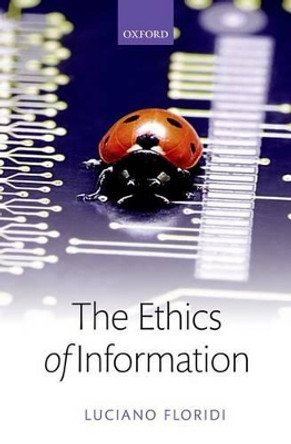Luciano Floridi develops an original ethical framework for dealing with the new challenges posed by Information and Communication Technologies (ICTs). ICTs have profoundly changed many aspects of life, including the nature of entertainment, work, communication, education, health care, industrial production and business, social relations, and conflicts. They have had a radical and widespread impact on our moral lives and on contemporary ethical debates. Privacy, ownership, freedom of speech, responsibility, technological determinism, the digital divide, and pornography online are only some of the pressing issues that characterise the ethical discourse in the information society. They are the subject of Information Ethics (IE), the new philosophical area of research that investigates the ethical impact of ICTs on human life and society. Since the seventies, IE has been a standard topic in many curricula. In recent years, there has been a flourishing of new university courses, international conferences, workshops, professional organizations, specialized periodicals and research centres. However, investigations have so far been largely influenced by professional and technical approaches, addressing mainly legal, social, cultural and technological problems. This book is the first philosophical monograph entirely and exclusively dedicated to it. Floridi lays down, for the first time, the conceptual foundations for IE. He does so systematically, by pursuing three goals: a) a metatheoretical goal: it describes what IE is, its problems, approaches and methods; b) an introductory goal: it helps the reader to gain a better grasp of the complex and multifarious nature of the various concepts and phenomena related to computer ethics; c) an analytic goal: it answers several key theoretical questions of great philosophical interest, arising from the investigation of the ethical implications of ICTs. Although entirely independent of The Philosophy of Information (OUP, 2011), Floridi's previous book, The Ethics of Information complements it as new work on the foundations of the philosophy of information.
About the AuthorLuciano Floridi is Professor of Philosophy and Ethics of Information at the University of Oxford, where he is also the Director of Reasearch and Senior Research Fellow of the Oxford Internet Institute, Governing Body Fellow of St Cross College, Distinguished Research Fellow of the Uehiro Centre for Practical Ethics, Faculty of Philosophy, and Research Associate and Fellow in Information Policy of the Department of Computer Science. He is also Adjunct Professor ("Distinguished Scholar in Residence") of the Department of Economics, American University, Washington D. C. Among his recognitions, he is recipient of the APA's Barwise Prize, AISB Fellowship, the IACAP's Covey Award, and the INSEIT's Weizenbaum Award. His other books include The Philosophy of Information (OUP, 2011), Information: A Very Short Introduction (OUP, 2010), and The Fourth Revolution (OUP, 2014).
ReviewsIn this groundbreaking work, Luciano Floridi builds the foundations of Information Ethics (IE) by arguing that an informational interpretation of reality is required due to our increased reliance on information and communication technologies (ICTs) for our well-being and success. * Brendan Rowe, The Review of Metaphysics *
Floridi's book challenges standard ethics. In standard ethics, life has priority in moral evaluation. However, in Floridi's Information Ethics, information systems are equal in moral value to living systems. Floridi develops his Ethics as part of a new ontological theory of the Infosphere. * Sheldon Richmond, Dialogue: Canadian Philosophical Review *
Book InformationISBN 9780198748052
Author Luciano FloridiFormat Paperback
Page Count 384
Imprint Oxford University PressPublisher Oxford University Press
Weight(grams) 574g
Dimensions(mm) 232mm * 157mm * 21mm







